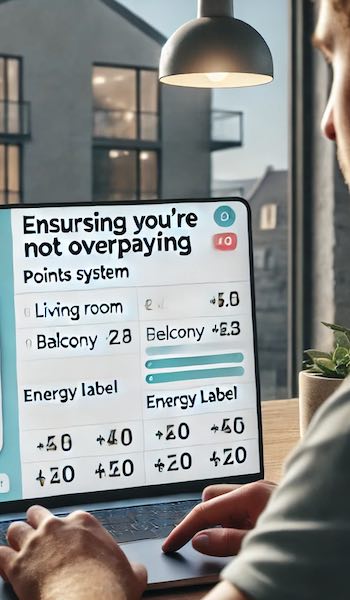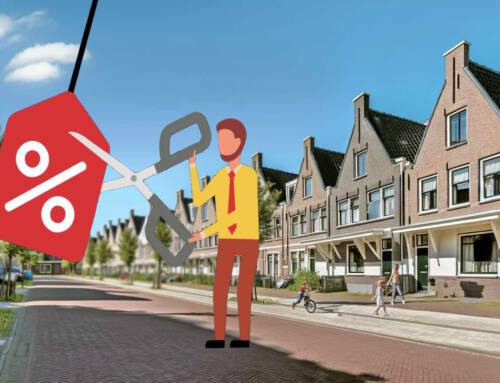Tip 17: Dutch House Rent Guide
Renting in the Netherlands 2024: New Rules to Ensure You’re Not Overpaying
The new Dutch rent cap regulations are here to protect tenants from excessive charges. Learn how to use the point system, verify your rent, and appeal if necessary.

POTENTIAL SAVINGS
Decent savings on budget airlines
EFFORT
Effort pays off in deals
Discover the 2024 Dutch rent cap rules and take control of your rental costs with our step-by-step guide.
Introduction
Renting in the Netherlands has undergone significant changes with the introduction of the Wet Betaalbare Huur (Affordable Rent Act), effective from July 1, 2024. These Dutch rent cap regulations 2024 aim to make renting more affordable by capping the maximum rent landlords can charge based on the quality and size of the property.
What Is the Point System?
The Dutch government uses the Woningwaarderingsstelsel (WWS) or point system as part of the Dutch rent cap regulations to determine the maximum rent that can be charged for a rental property. Each property is assigned points based on various factors, including size, location, energy efficiency, and amenities. The total number of points then translates into a maximum rent amount that the landlord can legally charge.
How Are Points Calculated?
Points are awarded based on the following criteria:
- Property Size: Larger properties earn more points.
- Location: Properties in desirable locations, such as city centers, receive higher points.
- Amenities: Additional points are given for amenities like a balcony, garden, or extra storage space.
- Energy Efficiency: Properties with higher energy efficiency ratings (e.g., those with double glazing, proper insulation, and energy-efficient appliances) receive more points.
- Facilities: Points are also allocated for the quality of facilities such as the kitchen and bathroom.
Calculating Your Property’s Points
To calculate your property’s points, you can use online tools provided by the Dutch government or tenant rights organizations. Here’s a step-by-step guide:
- Measure the Property: Start by accurately measuring the size of your rental property.
- Assess Amenities and Facilities: List all the amenities, such as outdoor spaces, parking, and quality of the kitchen and bathroom.
- Energy Efficiency: Check the energy label of your property.
- Use an Online Calculator: Input your data into an online WWS calculator to determine the total points.
Point Thresholds and Rent Caps
Once you have your property’s point total, it’s time to compare it to the legal rent cap. The Dutch government periodically updates the point thresholds, so you should check the latest information to ensure accuracy. Properties with a higher point total can command higher rent, but this is now capped to prevent excessive charges. As of the time of writing, this point system applies to houses that receive a maximum of 186 points, which typically translates to a maximum rent of €1,157.95. If your property has more than 186 points, the point system does not apply, and the rent can be set freely by the landlord, placing the property in the free market.
Ensuring You’re Not Overpaying
No one wants to pay more than they should for rent, especially with new regulations in place. This section will guide you through the steps to check if your rent is within the legal limits, helping you ensure you’re not overpaying and empowering you to take action if necessary.

How to Check If Your Rent is Legal
With the new regulations in place, it’s easier than ever to verify if your rent is within legal limits. Here’s how you can do it:
- Calculate Your Property’s Points: Use the WWS system as detailed above to determine your property’s points.
- Check the Rent Cap: Compare your property’s points against the latest rent cap data to see the maximum allowable rent.
- Use Online Tools: Websites like the Dutch government’s rent checker or tenant rights organizations offer calculators like the online WWS calculator where you can input your property’s details and receive an instant evaluation.
What to Do If You’re Overpaying
If your current rent exceeds the legal maximum, you have several options:
- Negotiate with Your Landlord: Approach your landlord with the point calculation and explain that the current rent is above the legal limit. Many landlords may agree to reduce the rent without further conflict.
- File a Complaint: If negotiation doesn’t work, you can file a formal complaint with the Huurcommissie (Rent Tribunal). This independent body will review your case and decide if your rent should be reduced.
Important Note on Contract Types
New Contracts (144-186 Points – Middle Sector):
If you have a new contract for a property with 144 to 186 points, you’re in the middle sector, where a maximum rent applies. If your rent exceeds this limit, you can appeal to the Huurcommissie, which will make a binding decision on the correct rent.
Social Housing Sector:
Tenants in social housing always have a maximum rent. If your rent exceeds the legal limit, you can ask the Huurcommissie to assess and adjust it.
Existing Contracts (Up to 143 Points – Free Sector):
If you have an existing contract for a property with up to 143 points in the free sector, from July 1, 2025, you will be entitled to a maximum rent. If your landlord doesn’t lower the rent by then, you can appeal to the Huurcommissie.
Existing Contracts (More than 143 Points – Free Sector):
Tenants with existing contracts for properties with more than 143 points in the free sector do not have a maximum rent. However, you can still ask the Huurcommissie to review the initial rent price within the first six months of the contract.
How and Where to Appeal
If you discover that your rent exceeds the legal cap, don’t worry—there are steps you can take to correct it. This section explains how to file an appeal with the Huurcommissie, the official body that handles rent disputes, and what to expect during the process.
Appealing Through the Huurcommissie
If you believe your rent exceeds the legal limit and your landlord refuses to lower it, the next step is to appeal through the Huurcommissie. Here’s how the process works:
- Gather Evidence: Start by collecting all necessary documentation, including your rental contract, proof of payment, and the point calculation of your property.
- File a Complaint: Submit your complaint to the Huurcommissie. You can do this online or via mail. Be sure to include all supporting documents and a clear explanation of why you believe your rent is too high.
- Await Review: The Huurcommissie will review your complaint, which typically involves an inspection of the property to verify the point calculation.
- Decision: After reviewing all evidence, the Huurcommissie will issue a decision. If they agree that your rent is too high, they will order the landlord to reduce it accordingly.
Possible Outcomes
- Rent Reduction: If the Huurcommissie rules in your favor, your rent will be legally reduced to the correct amount based on the WWS.
- No Change: If the Huurcommissie finds that your rent is within legal limits, no changes will be made.

Tips & Tricks
Receive Updates and Special Deals via Email
Subscribe to our newsletter for regular updates on fresh tips to save in The Netherlands and access to special deals just for our subscribers.
Your trust is important to us. We promise no spam, we won’t share your email with third parties, and you can unsubscribe at any time with just a click. Your privacy and peace of mind are our top priorities.




